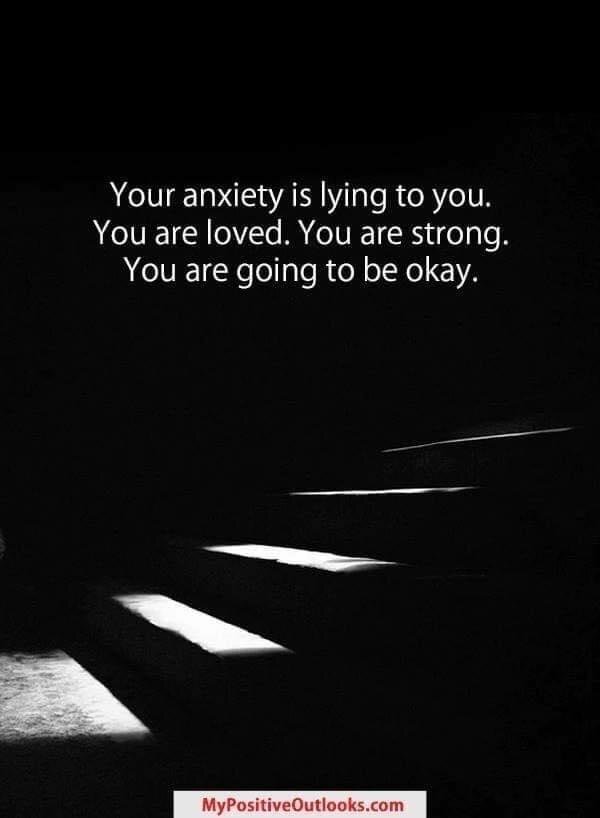- Articles
- Forum Archive
- Psychology, Psychiatry, Psychotherapy, and Health
- Therapy, Therapists, and Self-Help
You are using an out of date browser. It may not display this or other websites correctly.
You should upgrade or use an alternative browser.
You should upgrade or use an alternative browser.
- Thread starter gooblax
- Start date
More threads by gooblax
All of which is just OCD stabbing at you again, not reality.
BTW, an oldie but goodie:
Not important to who? It appears to be important to you. Who else matters? In therapy, the only one who matters is you.
I can assure you that it is exactly OCD-like.
David Baxter PhD
Late Founder
gooblax
MVP
I have the rescheduled session after work today assuming my therapist is well enough to work. I'm nervous about talking to him.
David Baxter PhD
Late Founder
Good luck. You can do this.
Let us know how it goes.
Let us know how it goes.
gooblax
MVP
Thanks. I think the session went ok. Pretty neutrally which is better than some of them. We still had some internet connection problems but it wasn't as bad as last time.
- I asked about the diagnosis thing and he said he thinks it's emotional rather than personality-related.
- Told him about my irrational feelings after the rescheduling and what happened after the previous session but I also said I didn't want him to reply to what I said about these and had a different topic to move straight into after telling him.
- Re-mentioned about how I obsess about session-stuff. He suggested writing down a decision about each obsession/over-analysis topic and then letting it go. I'm going to try it but will need to keep the list in one place so that when a topic reoccurs I'll be able to easily go back to find that decision.
- Going to try having sessions 2 weeks apart instead of 3. At the moment I can do this without having to look at my budget in greater detail due to his reduced COVID-19 prices.
David Baxter PhD
Late Founder
Excellent. Very well done, @gooblax. 
gooblax
MVP
I'm nervous about the session next week. I don't know if I can do this.
David Baxter PhD
Late Founder
Well of course you can do this.
What specifically is making you more nervous about this one than others?
What specifically is making you more nervous about this one than others?
gooblax
MVP
I think it's because of something I told him last session (about why I think I find it hard to talk to him sometimes) and assuming that he thinks it wasn't worth mentioning and I'm weak for it affecting me (even if he wouldn't intentionally say it, he would still think it, and might even accidentally say it).
Which makes a non-negligible chance of me finding it hard to talk to him in this session.
Which makes a non-negligible chance of me finding it hard to talk to him in this session.
David Baxter PhD
Late Founder
assuming that he thinks it wasn't worth mentioning and I'm weak for it affecting me (even if he wouldn't intentionally say it, he would still think it, and might even accidentally say it)
All of which is just OCD stabbing at you again, not reality.
gooblax
MVP
Plus with everything else going on in the world too, it probably makes more sense to cancel since it's not important.
Which makes a non-negligible chance of me finding it hard to talk to him in this session.
BTW, an oldie but goodie:
A Conversation with Dr. Wayne Dyer
Dyer: What would my life look like if I couldn’t think this thought?
Laughlin: Maybe you could elaborate on those.
Dyer: Well, I learned a lot about this from my friend Byron Katie who does something called The Work; she is a brilliant woman. I love her dearly. I give her credit because she helped me a lot with this and got me thinking about it and then I applied it to this excuse pattern. The display quote for this book is "Don't believe everything you think." The fact is, there is hardly any thought that we can ever have, if any at all, that we can be 100% certain will be true 100% of the time. So now we have a choice. On the one hand, you know that a thought you have may or may not be true, and you know that if you think this particular thought it's going to take you away from where you would like to be, such as with an excuse – I can't do this, it's going take too long, it's going to be too difficult… I'm too old, I'm too scared, I'm too fat – I am too… whatever it might be. And then you have the other choice, to think the opposite thought, which may be, it's going to be easy, it's not going to be risky, I can afford it. And again, while this thought may or may not be true, you know it will at least give you the opportunity to align with something that may help you to achieve what you want. Why would you pick the first one rather than the second one? It's just a simple, logical thing when put into this context.
David Baxter PhD
Late Founder
Plus with everything else going on in the world too, it probably makes more sense to cancel since it's not important.
Not important to who? It appears to be important to you. Who else matters? In therapy, the only one who matters is you.
You seem to have a continual love-hate relationship with therapy -- as if it was just as bad for you as good. A tenent of solution-focused therapy is that therapy is just one way to get better (or traditional therapy is just one form of therapy).
OCD can be a very lonely thing to have because even other people with OCD have their own obsessions that seem very different.
OCD can be a very lonely thing to have because even other people with OCD have their own obsessions that seem very different.
gooblax
MVP
I'm not convinced that it's particularly OCD-like, even if I recognise the obsessive nature of some of the thoughts.
It doesn't seem like my stuff should be important to me. More that I'm wrong for finding it important.
It doesn't seem like my stuff should be important to me. More that I'm wrong for finding it important.
To quote myself:
The same can be said of depression where rumination or avoidance is a typical reaction to automatic negative thoughts (ANTs) that only helps in the short term (compared to proactive, brain-boosting behaviors such as socialization, exercise, journaling, mindful breathing, being in nature, etc).
Daniel said:My ongoing therapy dilemma - Page 3
People with OCD don't have OCD because of the thoughts themselves. It's how they react to the thoughts that can be debilitating -- taking the thoughts at face value (to some degree -- as opposed to seeing the thoughts as just thoughts), trying to "fight fire with fire" like trying to ruminate away the thoughts, or doing some other behavior to get the thoughts to go away in the short term.
The same can be said of depression where rumination or avoidance is a typical reaction to automatic negative thoughts (ANTs) that only helps in the short term (compared to proactive, brain-boosting behaviors such as socialization, exercise, journaling, mindful breathing, being in nature, etc).
Last edited:
David Baxter PhD
Late Founder
I'm not convinced that it's particularly OCD-like, even if I recognise the obsessive nature of some of the thoughts.
It doesn't seem like my stuff should be important to me. More that I'm wrong for finding it important.
I can assure you that it is exactly OCD-like.
An Investigation of Self-Ambivalence in Obsessive-Compulsive Disorder - PubMed
Individuals vulnerable to obsessive-compulsive disorder (OCD) are hypothesized to have ambivalence about their self-worth, morality and lovability...
Self-ambivalence was significantly associated with OCD phenomena and OCD-relevant beliefs, after controlling for self-esteem, depression and anxiety. Further, OCD participants were significantly more ambivalent than the non-clinical groups, but did not differ from anxious controls. It was argued that these results provide a basis for extending the cognitive-behavioural model of OCD to include ambivalent self-perceptions as a component of the cognitive mechanisms relevant to the disorder.
"Not just right experiences": perfectionism, obsessive-compulsive features and general psychopathology - ScienceDirect
"Not just right experiences"...were significantly more strongly correlated with features of OCD than symptoms from other domains of psychopathology (e.g., social anxiety, trait anxiety, worry, depression)
Individuals vulnerable to obsessive-compulsive disorder (OCD) are hypothesized to have ambivalence about their self-worth, morality and lovability...
Self-ambivalence was significantly associated with OCD phenomena and OCD-relevant beliefs, after controlling for self-esteem, depression and anxiety. Further, OCD participants were significantly more ambivalent than the non-clinical groups, but did not differ from anxious controls. It was argued that these results provide a basis for extending the cognitive-behavioural model of OCD to include ambivalent self-perceptions as a component of the cognitive mechanisms relevant to the disorder.
"Not just right experiences": perfectionism, obsessive-compulsive features and general psychopathology - ScienceDirect
"Not just right experiences"...were significantly more strongly correlated with features of OCD than symptoms from other domains of psychopathology (e.g., social anxiety, trait anxiety, worry, depression)
Last edited:
David Baxter PhD
Late Founder
David Baxter PhD
Late Founder
Replying is not possible. This forum is only available as an archive.
Similar threads
- Replies
- 0
- Views
- 2K
- Replies
- 1
- Views
- 3K
- Replies
- 3
- Views
- 3K
- Replies
- 0
- Views
- 2K



